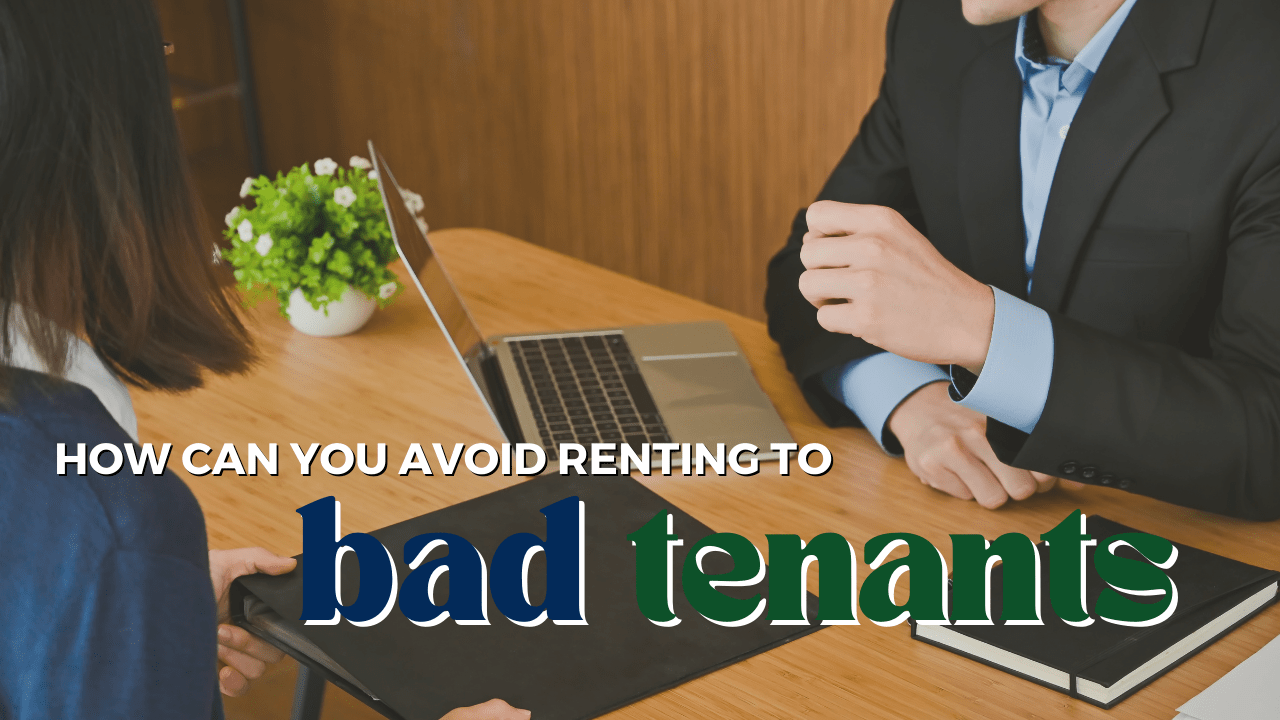Every landlord fears having a bad tenant in their property. It’s understandable. Everyone has heard horror stories about the tenants who won’t pay rent and then drag out the eviction process as long as possible. We’ve all heard about owners who were shocked to find property damage in excess of the security deposit left behind after a tenant moves out. Some tenants are petty, demanding, and rude.
How can you avoid renting to bad tenants?
It’s easier than you think, especially if you partner with an experienced Golden property management team.
Avoiding bad tenants requires you to implement a strict screening process. You’ll also have to conduct routine inspections and develop a good working relationship with your residents.
Unfortunately, people are unpredictable. Even with a great screening process, a communicative and open relationship, and the best property managers in Colorado – you never really know how people are going to behave. There’s always a risk that bad tenants are occupying your property.
Today, we want to tell you what you can do to reduce that risk and attract only responsible, well-qualified renters to your home.
Identify Potentially Bad Tenants with Pre-Screening Questions
No one is going to immediately identify themselves as a bad tenant, especially when they’re looking for a rental home. You’ll have to know what kind of red flags to look for and how to determine when a tenant is being honest with you.
This often comes with experience, which is why it’s so advantageous to rely on the screening process of property managers when you’re leasing a home.
You can weed out some potentially unqualified tenants by asking key questions right away – even before you show the property. You don’t want to waste your own time and you don’t want to waste the time of potential tenants.
Pre-screening before you schedule a showing is a great way to ensure you’re only showing the home to the renters who are likely to complete an application and be qualified. After you’ve marketed your rental property, there will likely be inquiries coming in by phone or by email. You’ll want to respond to all of them so you don’t lose potentially great renters.
They will have questions for you, and after you’ve answered those, ask a few of your own. These should include:
- When are you hoping to move into a new home?
- Why do you want to move from where you’re currently living?
- How many people will be living in the property with you?
- Do you own any pets and if so, what kind of pets?
- Do you have any previous evictions?
The answers to these questions will tell you whether your property is right for the person who wants to see it. When someone tells you they won’t be ready to move for a month and your rental home has already been vacant for two weeks, you might want to find someone who can move in sooner. If you’re not allowing pets and the person who calls has four dogs, there might be a reason to not schedule a showing.
Written Rental Standards Should be Specific
Another great way to avoid bad tenants is to establish your criteria and then stick to it when you’re screening applications. It’s also important to provide your rental standards to interested tenants before they apply.
Having this documented criteria will allow you to manage the expectations of a prospective tenant. When you show them exactly what you’re looking for in the tenant you approve and they know they’ve had a recent eviction or a low credit score or they don’t have the income to meet those requirements, they likely won’t apply at all. This will save you from chasing down late rent and running into problems later.
Standard rental criteria in written form also protects you from fair housing complaints. A documented and fair screening process will demonstrate that everyone is held to the same standards and provided those standards before they even apply.
Screening Basics: Check Income and Credit
In many cases, bad tenants are bad simply because they were never financially qualified to rent your home. Avoid this by looking carefully at every applicant’s financial situation. Some landlords will simply run a credit check, but you have to do more digging than that.
When you’re looking at a credit report or a credit score, don’t get hung up on the number. You also shouldn’t worry too much about minor debt or responsibilities that aren’t housing-related. Sometimes people fall behind on their credit card payments. That doesn’t indicate they’re necessarily bad tenants.
But, if you’re looking at a credit report that lists several overdue utility accounts, phone service that has been suspended, or outstanding debts owed to former landlords or apartment communities, you might want to avoid approving that tenant. Their financial history shows a questionable commitment to paying the bills that affect their home.
Always look for past evictions. Sometimes these will show up on a credit report but sometimes they won’t. There’s a national eviction database that you’ll want to check. Court records will also tell you if a prospective tenant has been evicted.
Tenants with a history of evictions are almost always going to be bad tenants. Not necessarily because they’re bad people, but simply because they were unable to fulfill their obligations as a renter. There are so many steps that tenants can take to avoid eviction – including leaving the property voluntarily – that you know a legal eviction means they were unwilling to work things out with their landlord. Be wary of prior evictions, especially when they’re recent and especially when there’s more than one.
Income should be one of the driving factors in whether or not you’ll approve a tenant. You can avoid renting to bad tenants by ensuring they earn enough to cover the rent.
Ask for verification. Bad tenants are good at forging documents and faking income.
Criminal History and Prior Rental History
Bad tenants typically have funny finances. You’ll see the red flags and you’ll identify the problems in their credit or income history.
Bad tenants also leave a trail of unhappy landlords. That’s why it’s so important to check landlord references. On your application, ask for the contact information of a few recent landlords. You could talk to their current landlord as well, but if that landlord is desperate to get the tenant out of their property – they might be willing to tell you anything you want to hear.
Talk to at least one former landlord and do the necessary research to ensure you’re actually talking with a property owner or a property manager. Unscrupulous tenants are famous for providing the names and phone numbers of friends or relatives instead of actual landlords. You’ll have to do a little digging.
Once you know you’re speaking to a landlord, ask about their experience with the tenant. Specifically, we recommend you find out:
- Whether rent was paid on time. Ask how many months it was late and how quickly the tenant caught up. Were legal notices served? Did payment arrangements become necessary?
- Did the tenant receive their security deposit back or were damages deducted from it?
- Were there any lease violations or problems and complaints with neighbors?
- Did the tenants have any pets? Were they well behaved and did the tenant comply with your pet policy?
- Was the appropriate amount of notice given to the landlord when the tenant moved out?
- Would you rent to this tenant again?
If you talk to two or three former landlords and they all have glowing things to say about the tenant you’re considering, it’s unlikely this is a bad tenant.
Criminal history is also important to check. Minor traffic violations are nothing to get too concerned about, but you don’t want to see felony convictions for things like assault, drugs, or violent acts. You don’t want to put someone in your property who has been convicted of grand larceny. Make sure you are up-to-date with fair housing federal and state regulations or what you can and cannot consider when it comes to criminal convictions.
Tenant Relationships and Golden Property Management
 To protect the condition of your property and the profitability of the tenancy as a whole, you need to establish good relationships with your tenants. This doesn’t mean you should become their friends. You still want to be able to enforce the lease and hold your tenants accountable without any conflict.
To protect the condition of your property and the profitability of the tenancy as a whole, you need to establish good relationships with your tenants. This doesn’t mean you should become their friends. You still want to be able to enforce the lease and hold your tenants accountable without any conflict.
When you have a respectful and positive relationship in place with your tenants, they’re unlikely to do bad things. You’ll also have a better chance of retaining them and reducing the risk of turnover and vacancy.
Golden property managers can help you avoid bad tenants. We can also ensure that good relationships are in place with your renters, and a positive rental experience is enjoyed by everyone, our company motto is “kindness matters”. For more information, please contact us at Laurel Property Services, Inc. In addition to providing property management in Golden, we also serve Wheatridge, Morrison, Lakewood, Arvada, and Genesee, CO.



